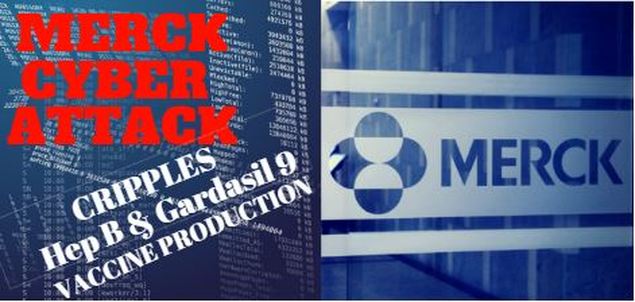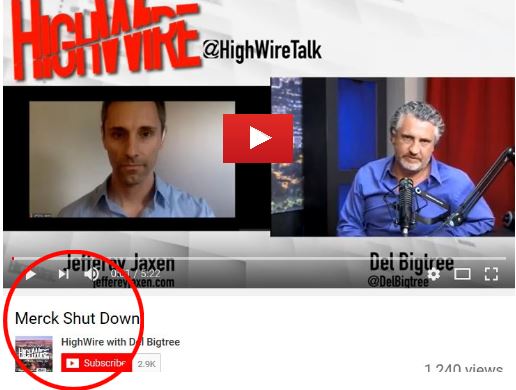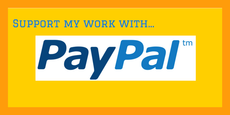On July 5, the headline at JeffereyJaxen.com read “MERCKED: Pharma Giant Still Paralyzed From Hacking Attack.” A follow-up report by JeffereyJaxen.com a few weeks later elaborated “Cyber Attack Halts MERCK Hep B Vaccine Production, Company Forced to Exit Market.” Except for Del Bigtree's weekly HighWire show [video below] and the Robert Scott Bell radio show, no media outlet gave Merck’s shutdown any coverage beyond listing the company among those crippled by the June 27th cyber attack.
On July 21, the US Centers for Disease Control and Prevention (CDC) and the American Academy of Pediatrics (AAP) quietly broke news of a major vaccine shortage announced by Merck.
The CDC stated in July:
“Merck is not currently distributing its adult Hepatitis B vaccine and does not expect to be distributing adult Hepatitis B vaccine between now and the end of 2018. Additionally, Merck anticipates that its pediatric Hepatitis B vaccine will be unavailable between early August 2017 and mid-January 2018. Merck’s supply of the dialysis formulation of Hepatitis B vaccine, however, is not affected and is expected to remain available. GSK has sufficient supplies of adult and pediatric Hepatitis B vaccines to address these anticipated gap [sic] in Merck’s supply of adult and pediatric Hepatitis B vaccines during these time periods; however, preferences for a specific presentation (i.e., vial versus syringe) may not be met consistently during this time.”
The CDC’s statement was mirrored by the AAP’s:
“In a letter to providers, Merck said demand around the world and manufacturing process updates caused the shortage of Recombivax HB in both pediatric and adult formulations.”
MERCK’s predicament was immediately spotlighted by JeffereyJaxen.com:
“Given the events of the last month, it appears highly unlikely that “manufacturing process updates” caused the now 7-month Merck’s Hepatitis B vaccine shortage. The announcement amounts to Merck essentially exiting the global market as a provider of both adult and pediatric hepatitis B vaccines until their estimated “mid-January 2018.” In addition Merck has been forced to surrender its global hepatitis B vaccine market position to competitor GlaxoSmithKline.”
More than four months later, for whatever reason, mainstream media received the green light to begin catching up on reporting the truth that has been disseminated by independent media some time ago. Merck has experienced such extensive losses from the cyber attack that the company is still feeling the effects of it presently. FOX Business reports:
“Another Petya-related hit to Merck sales: the company said it borrowed doses of its Gardasil 9 vaccine from a U.S. Centers for Disease Control and Prevention pediatric vaccine stockpile to fulfill customer orders, because the cyberattack caused a temporary production shutdown, and there was higher-than-expected demand. That cut third-quarter sales by $240 million.”
Merck's Gardasil 9 and Hep B vaccine production has taken a massive hit. What other vaccines have been affected? When the cyber attack hit, were the vaccines in production scrapped or are they now in circulation? Why did no other media outlet report on it sooner even though the information was out there on July 5?
The pharmaceutical complex, comprised of corporations such as Merck, is known to make up roughly 70 percent of mainstream media ad revenue on non-election years. According to a report by Kantar Media, Big Pharma spending on advertising in the US market rose in 2016 to $6.4 billion, with Merck spending $285.2 million on Direct-to-Consumer marketing alone. The bottom line is that Big Pharma signs the lion's share of mainstream media's paychecks and therefore is a major driving force in what topics should or should not be covered.
Is an end of the Hep B vaccine production a bad thing? No long-term study has shown that giving newborn babies a Hep B vaccine is safe. To the contrary, studies and whistleblowers have warned that the vaccine is actually dangerous. In addition, the pre-licensure safety studies to get the Hep B vaccine approved were seriously flawed. For example, adverse event reporting during the pre-licensure study was tracked for four and five days for Merck’s and GlaxoSmithKline's Hep B vaccines, respectively. Any adverse event or death after the four- or five-day period was not attributed to the vaccine. In addition, the vaccine was not tested against a saline-based placebo.
It should also be noted that the vaccine products of all the big drug houses are facing greater public and legal scrutiny. The US Department of Health and Human Services (HHS), which is responsible for overseeing the safety monitoring of the US vaccination program,has been served a legal notice by the nonprofit Informed Consent Action Network (ICAN). The ICAN’s notice to HHS and its Acting Secretary Eric Hargan alleges that the agency has failed in its duty to ensure vaccine safety.
The bottom line is that the mainstream media has been caught running cover for Merck while the company's vaccine products are now in America's public spotlight due to the legal notice to HHS. Looking honestly at all the recent events and available data, it appears that a noose is slowly tightening around a longtime fraudulent vaccine industry that has operated with impunity for over three decades.
On July 21, the US Centers for Disease Control and Prevention (CDC) and the American Academy of Pediatrics (AAP) quietly broke news of a major vaccine shortage announced by Merck.
The CDC stated in July:
“Merck is not currently distributing its adult Hepatitis B vaccine and does not expect to be distributing adult Hepatitis B vaccine between now and the end of 2018. Additionally, Merck anticipates that its pediatric Hepatitis B vaccine will be unavailable between early August 2017 and mid-January 2018. Merck’s supply of the dialysis formulation of Hepatitis B vaccine, however, is not affected and is expected to remain available. GSK has sufficient supplies of adult and pediatric Hepatitis B vaccines to address these anticipated gap [sic] in Merck’s supply of adult and pediatric Hepatitis B vaccines during these time periods; however, preferences for a specific presentation (i.e., vial versus syringe) may not be met consistently during this time.”
The CDC’s statement was mirrored by the AAP’s:
“In a letter to providers, Merck said demand around the world and manufacturing process updates caused the shortage of Recombivax HB in both pediatric and adult formulations.”
MERCK’s predicament was immediately spotlighted by JeffereyJaxen.com:
“Given the events of the last month, it appears highly unlikely that “manufacturing process updates” caused the now 7-month Merck’s Hepatitis B vaccine shortage. The announcement amounts to Merck essentially exiting the global market as a provider of both adult and pediatric hepatitis B vaccines until their estimated “mid-January 2018.” In addition Merck has been forced to surrender its global hepatitis B vaccine market position to competitor GlaxoSmithKline.”
More than four months later, for whatever reason, mainstream media received the green light to begin catching up on reporting the truth that has been disseminated by independent media some time ago. Merck has experienced such extensive losses from the cyber attack that the company is still feeling the effects of it presently. FOX Business reports:
“Another Petya-related hit to Merck sales: the company said it borrowed doses of its Gardasil 9 vaccine from a U.S. Centers for Disease Control and Prevention pediatric vaccine stockpile to fulfill customer orders, because the cyberattack caused a temporary production shutdown, and there was higher-than-expected demand. That cut third-quarter sales by $240 million.”
Merck's Gardasil 9 and Hep B vaccine production has taken a massive hit. What other vaccines have been affected? When the cyber attack hit, were the vaccines in production scrapped or are they now in circulation? Why did no other media outlet report on it sooner even though the information was out there on July 5?
The pharmaceutical complex, comprised of corporations such as Merck, is known to make up roughly 70 percent of mainstream media ad revenue on non-election years. According to a report by Kantar Media, Big Pharma spending on advertising in the US market rose in 2016 to $6.4 billion, with Merck spending $285.2 million on Direct-to-Consumer marketing alone. The bottom line is that Big Pharma signs the lion's share of mainstream media's paychecks and therefore is a major driving force in what topics should or should not be covered.
Is an end of the Hep B vaccine production a bad thing? No long-term study has shown that giving newborn babies a Hep B vaccine is safe. To the contrary, studies and whistleblowers have warned that the vaccine is actually dangerous. In addition, the pre-licensure safety studies to get the Hep B vaccine approved were seriously flawed. For example, adverse event reporting during the pre-licensure study was tracked for four and five days for Merck’s and GlaxoSmithKline's Hep B vaccines, respectively. Any adverse event or death after the four- or five-day period was not attributed to the vaccine. In addition, the vaccine was not tested against a saline-based placebo.
It should also be noted that the vaccine products of all the big drug houses are facing greater public and legal scrutiny. The US Department of Health and Human Services (HHS), which is responsible for overseeing the safety monitoring of the US vaccination program,has been served a legal notice by the nonprofit Informed Consent Action Network (ICAN). The ICAN’s notice to HHS and its Acting Secretary Eric Hargan alleges that the agency has failed in its duty to ensure vaccine safety.
The bottom line is that the mainstream media has been caught running cover for Merck while the company's vaccine products are now in America's public spotlight due to the legal notice to HHS. Looking honestly at all the recent events and available data, it appears that a noose is slowly tightening around a longtime fraudulent vaccine industry that has operated with impunity for over three decades.








 RSS Feed
RSS Feed